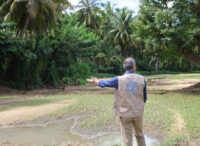An estimated 1.2bn children are subject to this ‘harmful practice’ each year, affecting physical and mental wellbeing, report finds.
The World Health Organization has declared corporal punishment a global public health concern that causes serious harm to children’s physical and mental wellbeing, and can lead to criminal behaviour.
A new report found that across 49 low- and middle-income countries, children exposed to corporal punishment – defined as “any punishment in which physical force is used and intended to cause some degree of pain or discomfort, however light” – were 24% less likely to be developmentally on track than children who were not.
Globally, an estimated 1.2 billion children are subjected to corporal punishment each year. In the past month, 17% of all children exposed to corporal punishment suffered severe forms – such as being hit on the head, face or ears, or hit hard and repeatedly, said the report.
“There is now overwhelming scientific evidence that corporal punishment carries multiple risks to the health of children,” said Etienne Krug, director of the WHO department for health determinants, promotion and prevention. “It offers no benefits to the behaviour, development or wellbeing of children and no benefit to parents or societies either.
“Corporal punishment is a global public health concern – it’s time to end this harmful practice to ensure that children thrive at home and at school.”
Children exposed to corporal punishment are more likely to have anxiety, depression, low self-esteem and emotional instability, which continue into adulthood and can lead to alcohol and drug use, violent behaviour and suicide.
“There is now overwhelming scientific evidence that corporal punishment carries multiple risks to the health of children,” said Etienne Krug, director of the WHO department for health determinants, promotion and prevention. “It offers no benefits to the behaviour, development or wellbeing of children and no benefit to parents or societies either.
“Corporal punishment is a global public health concern – it’s time to end this harmful practice to ensure that children thrive at home and at school.”
Children exposed to corporal punishment are more likely to have anxiety, depression, low self-esteem and emotional instability, which continue into adulthood and can lead to alcohol and drug use, violent behaviour and suicide.
Tens of millions have placed their trust in the Guardian’s fearless journalism since we started publishing 200 years ago, turning to us in moments of crisis, uncertainty, solidarity and hope. More than 1.5 million supporters, from 180 countries, now power us financially – keeping us open to all, and fiercely independent. Will you make a difference and support us too?
Unlike many others, the Guardian has no shareholders and no billionaire owner. Just the determination and passion to deliver high-impact global reporting, always free from commercial or political influence. Reporting like this is vital for democracy, for fairness and to demand better from the powerful.
And we provide all this for free, for everyone to read. We do this because we believe in information equality. Greater numbers of people can keep track of the global events shaping our world, understand their impact on people and communities, and become inspired to take meaningful action. Millions can benefit from open access to quality, truthful news, regardless of their ability to pay for it.











Leave a comment